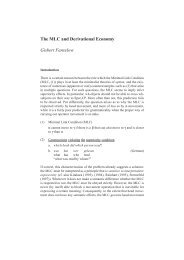'Split wh-constructions in Classical and Modern Greek'
'Split wh-constructions in Classical and Modern Greek'
'Split wh-constructions in Classical and Modern Greek'
You also want an ePaper? Increase the reach of your titles
YUMPU automatically turns print PDFs into web optimized ePapers that Google loves.
Clearly, the nom<strong>in</strong>al does not go through Spec-AgroP, s<strong>in</strong>ce no<br />
agreement shows up.<br />
2.3 Corver (1990)<br />
We believe that the null head modifier account we outl<strong>in</strong>ed <strong>in</strong><br />
section 2.1 is also superior to Corver’s (1990) analysis <strong>wh</strong>ich<br />
proposes that the accessibility of left branch NP-<strong>in</strong>ternal constituents<br />
is due to the absence of a DP-projection <strong>in</strong> nom<strong>in</strong>als.<br />
(he concentrates on Russian <strong>and</strong> Polish). On his account, the fact<br />
that NPs are bare makes it possible to extract nom<strong>in</strong>als without<br />
violat<strong>in</strong>g the ECP <strong>and</strong> the Subjacency Condition. When, for example,<br />
the left branch constituent is extracted from with<strong>in</strong> a direct<br />
object NP, the direct object is L-marked by the verb. Therefore,<br />
the NP is not a block<strong>in</strong>g category nor an L-barrier. The adjectival<br />
element can be raised from with<strong>in</strong> the NP to the specifier<br />
of CP via adjunction to VP, without cross<strong>in</strong>g any L-barrier. So<br />
neither the ECP nor Subjacency is violated.<br />
Corver claims that support for his view comes from the fact<br />
that these languages do not have articles correspond<strong>in</strong>g to the<br />
<strong>and</strong> a <strong>in</strong> English:<br />
(31) Ptak patrzy na kota. (Polish)<br />
bird looks at cat<br />
‘The/a bird is look<strong>in</strong>g at the/a cat.’<br />
(Corver 1990:332)<br />
(32) Eta dom i sat. (Russian)<br />
it house <strong>and</strong> garden<br />
‘It’s a/the house <strong>and</strong> a/the garden.’<br />
Demonstratives, possessors, etc. <strong>in</strong> these languages are argued to<br />
be adjectives, not determ<strong>in</strong>ers.<br />
160

















